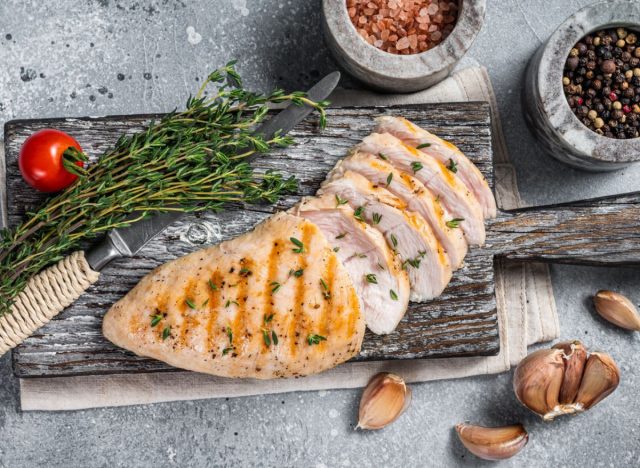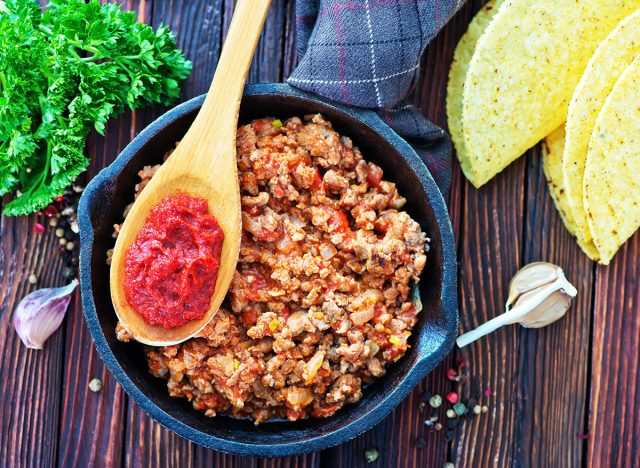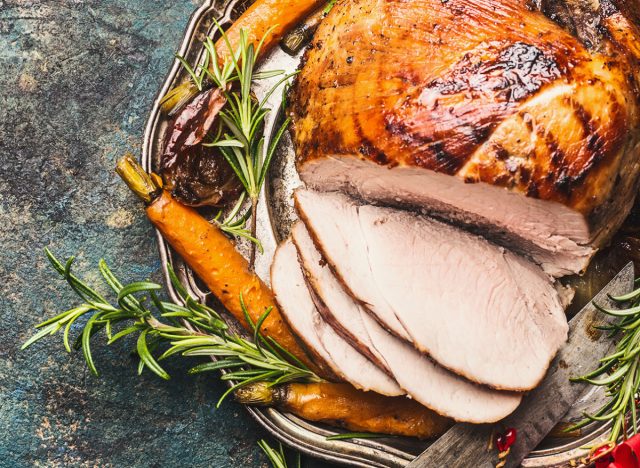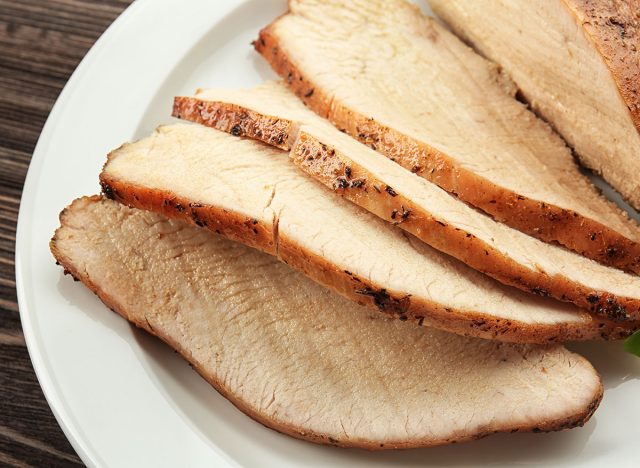What Happens to Your Body When You Eat Turkey

If you've ever been to a traditional Thanksgiving dinner, then you know that the holiday feast typically revolves around the turkey. Of course, that's not the only part of the meal that everyone looks forward to—there are a plethora of delicious appetizers, side dishes, desserts, and festive cocktails, too. You might be inclined to avoid thinking about nutrition when it comes to your holiday meals, and understandably so! After all, it's a time to gather with friends and family to enjoy and indulge; not a time to worry about counting calories. But whether you're curious about the nutritional value of your Thanksgiving plate or not, you may be happy to learn that there are plenty of health benefits associated with eating turkey.
That's right: Turkey is an excellent go-to food at any time of year, and can be an easy way to add protein to your sandwich at lunch or your salad at dinner. You can even swap in turkey sausage at breakfast for a satisfying and healthier alternative to pork sausage.
So, what happens to your body when you eat turkey? Read on to learn about some specific benefits—and a few potential downsides. (Hey, no food is perfect!) And for more holiday tips, check out 13 Delicious Ways to Use Thanksgiving Leftovers.
You'll get a protein boost.

One of the biggest perks of eating turkey is that it's high in protein, and when it comes to meat products, it contains some of the highest levels.
In a 3-ounce serving of turkey breast, for example, you're getting almost 26 grams of complete, high-quality protein.
"Turkey is a good source of lean protein, which is essential for muscle growth, repair, and overall body function," says Mary Sabat MS, RDN, LD. "Protein can also help with satiety and weight management."
You won't consume loads of fat.

Even though most meat products contain high levels of protein, some options are much higher in saturated fat and total fat than others. For instance, 3 ounces of 80% lean ground beef has about 17 grams of total fat almost 6.5 grams of saturated fat, while 3 ounces of ground turkey contains a little over 8 grams of total fat and 0.5 grams of saturated fat.
Depending on your specific health needs and goals, you may or may not be focusing on your fat intake. If you are, turkey can be a great low-fat, high-protein choice.
"Turkey breast, in particular, is low in fat, especially saturated fat," adds Sabat. Not only that, but she adds that "It's also lower in calories compared to some other meats."
You'll get a variety of different nutrients.

Aside from protein, you'll also be gifting your body with loads of nutrients when you chow down on turkey.
"Turkey contains various essential nutrients, including vitamins B3 (niacin), B6 (pyridoxine), B12 (cobalamin), selenium, and zinc," says Sabat. "These nutrients play important roles in metabolism, immune function, and overall health."
Specifically, vitamin B12 has been linked to better immune function and the ability to help fight off viral infections, and can also help improve mood and brain function.
Zinc has also been found to aid in bettering your immune system and the overall functioning of your metabolism.
You will get close to your daily value of selenium.

As we already mentioned, turkey contains a ton of powerful nutrients that your body needs daily. Among them is selenium: a 3-ounce serving of turkey breast contains around 47% of your daily value of this nutrient.
But what does selenium do? "Selenium is an essential mineral that acts as an antioxidant, protecting cells from damage and supporting a healthy immune system," says Sabat. Beyond that, selenium is also vital to the health of your thyroid.
You'll get a good amount of niacin, too.

Another important nutrient you'll get a hefty dose of when you eat turkey is niacin, also known as vitamin B3. In a serving of turkey breast, you'll get around 62% of your daily value of niacin and around 43% of the daily value in a serving of ground turkey.
Niacin—which is found in many animal products—is an important nutrient for things like "DNA repair and playing a role in maintaining healthy skin," says Sabat.
This nutrient has also been linked to better heart and blood vessel health, as well as the potential to help lower the risk of cardiovascular disease.
You may feel sleepy.

It's true: There is a legitimate scientific reason that you may feel sleepy after eating turkey. Of course, after a big holiday meal, part of that may be due to the amount of food your body has to digest. But turkey does contain tryptophan, an element that is known to make you feel more tired after consuming it.
"Eating turkey is often associated with drowsiness due to its content of the amino acid tryptophan," says Trista Best, MPH, RD, LD, at Balance One Supplements. "Tryptophan is a precursor to serotonin, a neurotransmitter that can be converted into melatonin, a hormone that regulates sleep."
But if you're feeling sleepy after your Thanksgiving dinner, "This sleepiness is also exacerbated by other factors such as carbohydrate-rich side dishes, overall caloric intake, and the relaxation associated with holiday gatherings," Best adds.
You'll feel more full.

According to Best, turkey contains nutrients that help keep you full.
"For one, turkey is a rich source of protein, which plays a crucial role in promoting satiety and reducing appetite, mainly because proteins take longer to digest than carbohydrates, leading to a prolonged feeling of fullness," she says.
On top of this, "The protein in turkey stimulates the release of hormones like cholecystokinin (CCK) and peptide YY (PYY), which signal the brain that you are satisfied," says Best, "and the amino acid content in turkey supports muscle health, contributing to a sense of overall well-being and fullness."
You may consume a lot of sodium.

This one is not a benefit, but that shouldn't be viewed as a deterrent, especially if you're eating fresh turkey. A serving of unprocessed turkey breast or ground turkey contains minimal sodium, but processed turkey products contain fairly high levels of sodium. For instance, a serving of Boar's Head Sliced Roasted Turkey Breast contains 380 milligrams of sodium per 2-ounce serving, whereas an unprocessed serving of turkey breast contains only 84 milligrams.
"Processed turkey products like deli meats or turkey sausages can be high in sodium," says Sabat. She adds that certain individuals who are more vulnerable to high blood pressure or heart problems may want to monitor the type of turkey they're consuming.
- Source: https://fdc.nal.usda.gov/fdc-app.html#/food-details/171496/nutrients
- Source: https://www.ncbi.nlm.nih.gov/pmc/articles/PMC6566799/
- Source: https://www.sciencedirect.com/science/article/abs/pii/S0268005X1630340X
- Source: https://fdc.nal.usda.gov/fdc-app.html#/food-details/171496/nutrients
- Source: https://fdc.nal.usda.gov/fdc-app.html#/food-details/174036/nutrients
- Source: https://fdc.nal.usda.gov/fdc-app.html#/food-details/171496/nutrients
- Source: https://pubmed.ncbi.nlm.nih.gov/34791425/
- Source: https://www.mayoclinic.org/diseases-conditions/depression/expert-answers/vitamin-b12-and-depression/faq-20058077#:~:text=Vitamin%20B%2D12%20and%20other,may%20be%20linked%20to%20depression.
- Source: https://www.mayoclinic.org/drugs-supplements-zinc/art-20366112#:~:text=Zinc%2C%20a%20nutrient%20found%20throughout,meat%20and%20fortified%20breakfast%20cereals.
- Source: https://ods.od.nih.gov/factsheets/Selenium-HealthProfessional/#:~:text=The%20DV%20for%20selenium%20is,years%20and%20older%20%5B13%5D.
- Source: https://fdc.nal.usda.gov/fdc-app.html#/food-details/171496/nutrients
- Source: https://ods.od.nih.gov/factsheets/Niacin-HealthProfessional/#:~:text=**%20DV%20%3D%20Daily%20Value.,years%20and%20older%20%5B10%5D.
- Source: https://fdc.nal.usda.gov/fdc-app.html#/food-details/171506/nutrients
- Source: https://journals.physiology.org/doi/full/10.1152/ajpregu.00734.2006#:~:text=Cholecystokinin%20(CCK)%2C%20peptide%20YY,ghrelin%20is%20inhibited%20by%20eating.









